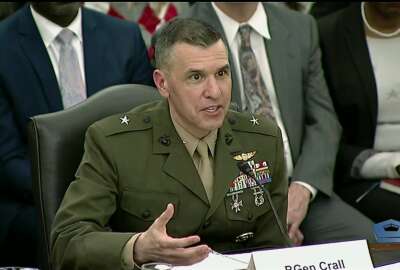
NSCAI wants to work with smaller companies too
The Congressionally-mandated National Security Commission on Artificial Intelligence is seeking input from small and medium sized businesses.
Best listening experience is on Chrome, Firefox or Safari. Subscribe to Federal Drive’s daily audio interviews on Apple Podcasts or PodcastOne.
Federal entities across the board have been striving to adopt and become skilled in the art of artificial intelligence. Now the Congressionally-mandated National Security Commission on Artificial Intelligence, a creature of the 2019 Defense Authorization law, is seeking input from small and medium sized businesses. With more about what the commission is up to, Federal Drive with Tom Temin turned to commission member the former assistant secretary of defense for acquisition, Katharina McFarland.
Interview transcript:
Tom Temin: Ms. McFarland, good to have you on.
Katharina McFarland: So nice to meet with you, Tom. Thank you.
Tom Temin: Tell us more about the commission itself, what it’s chartered to do and what you’ve been doing so far since authorized by Congress.
Katharina McFarland: Certainly. As you mentioned, Congress created the National Security Commission on Artificial Intelligence in the 2019 National Defense Authorization Act. We’re an independent commission and federal advisory committees with a mandate to consider the methods and means necessary to advance the development of artificial intelligence, machine learning and associated technologies for US national security. I served as one of 15 commissioners who were appointed by Congress and the executive branch and have experience in industry, academia and government. That includes our chairman Dr. Eric Schmidt, and vice chairman Bob Work. Congress gave the commission a broad mandate to examine artificial intelligence. We assessed in the first year our AI posture by considering national competitiveness, the means to sustain technological advantage, trends in international cooperation and competitiveness, ways to foster greater investment in basic and advanced research, workforce training, potential risks and opportunity of military use, ethical concerns, establishment of data standards and the future evolution of global use of AI. As you can see, AI is here and growing. And we need to understand our position today and ultimately make recommendations on how best to foster AI developments that will serve the interests of the American people, protect our national security and uphold our American values. We see our nation in a true global rivalry for power, and a fierce contest between authoritarianism and democracy. Not all global governments share our values, and we need to understand our roles and responsibilities.
Tom Temin: So there are quite a number of defense organizations and civilian agencies for that matter that are also pursuing artificial intelligence. How do you find your place among activities that are already well advanced, such that you bring something new to the whole endeavor?
Katharina McFarland: Well, as you know, we’ve recently sent out a public request for comments. We had as a commission sought input from both small, medium and large sized firms. And the recent one was for the small and medium sized firms across the United States, on methods and means by which government could engage with the private sector and bolster commercial AI innovation. We’ve also provided a series of specific questions to firms to answer broadly speaking, the questions focused on the ways government can further catalyze AI innovation, fan the National Security innovation base and make it easier for firms to do business with the federal government, which is in our mandate and not the same with others that are working in this area. Our goal is to use that feedback that we’ve received to make specific recommendations that can be implemented through improvements in our statutes, regulations, policies, organization, training, culture, whatever we need, as part of a special project on public and private partnerships.
Tom Temin: Because a lot of the basis for, I guess difficulty that the military is having, and to maybe a lesser extent, some of the civilian side agencies, is that engaging with many of the companies doing innovation in this area, whether they be large or small, you’re often dealing with contractors, that are companies I should say, that have not been federal contractors. And so there seems to be a search for a way to, I guess, get more agility on the government’s part in being able to engage with those companies without necessarily having to resort to every provision in the FAR. Would you say that’s part of the effort here?
Katharina McFarland: Absolutely. And as you mentioned, I was the former Assistant Secretary for acquisition, and I spent my entire career, more than 34 years, working in this arena. And it’s very important for us to change our dynamic, our processes and policies. Not the practice the practice is kind of like what engineering and physics allows. But our practice is implemented through process. And in doing so we need to have an understanding how can we improve it. It’s decades old. And so our special project on public private partnerships is geared towards doing that. And when we consider public private partnerships, it’s relative to the competitiveness of the United States in artificial intelligence, machine learning and other associated technologies. So in accordance with the direction from Congress, this commission established a special project to do this. And we engage stakeholders from across industry, academia, government, civil society — with two main objectives. The first is to assess the national security innovation base in order to get access to it, and the United States government in poll, how do they work with it? And secondly, to identify options for improving that cooperation, to address that bureaucracy that you talked about, and identify options for improving cooperation. Really, it’s focused on in increasing the well being of our citizens, strengthening the nation’s intrapreneurial ecosystems and protecting our security. We’ve enjoyed tremendous bipartisan support from leadership across the government to do this, as well as academia, civil societies and private sectors. And we’re particularly and especially grateful for the time and effort private sector leaders have spent explaining their roles and their opportunities as they see them in the AI OPA system, and highlighting these opportunities to leverage AI for national security purposes.
Tom Temin: And earlier the commission came up with seven consensus principles on, I guess, artificial intelligence. Without describing each one in detail, what generally do they cover? And how did you arrive at them?
Katharina McFarland: Well, we did an assessment, an assessment that culminated in 2019 in November, and we submitted a first interim report to Congress which articulated our assessment of the current state of AI in the United States purposefully for national security. But this report confirmed that the United States is in that strategic competition with AI at its center. AI is indicative, it’s expanding. The future of our national security and economy are really at stake. The report calls for confirmation of understanding of the true global AI challenge and its environment, the need for new imagination and innovation. And, of course, decisive action, a commitment from our leadership is necessary, the private sector and society to address this challenge. It called upon our private sector leadership and government officials to build a shared sense of responsibility for the welfare and security of the American people. We need to have everyone understand and not fear AI, and industry and academia can maximize that promise of AI and minimize the national security risks posed by AI. It’s necessary. So in January, after we completed that assessment, we began releasing recommendations that were based on those principles as you addressed, provide concrete steps to Congress in the executive branch that can be taken to overcome the concerns and realize the principles that we believe are outlined in the value system that we own as Americans to take a step forward to meet that challenge in an AI future.
Tom Temin: And where are you in this solicitation of information from the small and medium sized businesses? Is it starting to roll in? And what will you do with it when it’s all closed up for a comment?
Katharina McFarland: We were very fortunate, and again, I’m so grateful for the response to it. We received over 83 pages of very substantive and pithy input. We’ve conducted interviews, we are culminating with a couple more I think over the next two weeks. The commissioners are taking that input after our questioning to get more depth and understanding of what they intended. And we will now prepare analysis and recommendations out of that for a final report, which we’ll publish and submit to Congress and the executive branch in March of 2021. If you’re interested in reading it for the public here, we have a website on the National Security Council’s Commission on Artificial Intelligence. And you can read all of our reports from the assessment to the recommendations that we’ve provided to Congress of which by the way has largely been implemented by partisanship. It’s been, as I stated earlier, marvelous. The submissions that we received from these small and medium sized firms will inform those final recommendations, I need to underscore. And we help from there the US to become a better customer to these innovation firms. We’re intending to submit actionable, comprehensive recommendations that have strong buy in from the public and private sectors by virtue of doing this private party and private public interviews. And our goal is to set the US on a path to win in this AI charge technology competition that fuses national economic competitiveness, great power rivalry and a fierce contest between authoritarian and democracy.
Tom Temin: Having spent all these years in the Defense Department, and now you’ve had a pretty good private sector career since retiring from the military, has the artificial intelligence journey, from the commission standpoint, been an eye opener for you personally?
Katharina McFarland: Absolutely. I knew that technology was expanding. And I knew that I couldn’t touch all of the technology I needed for national security purposes because of impediments. But I didn’t realize how great the impediments were. But what was more interesting was that the nature of humans are to find innovative ways to achieve what they need to. And part of our assessment was to discover there are pockets within this larger federal government who have found ways and means of implementing advances in this innovative technology and to leverage that and be able to apply that across the spectrum of our need has been very rewarding. It’s been refreshing to see that innovative culture still exists in the United States.
Tom Temin: Katharina McFarland is a member of the National Security Commission on Artificial Intelligence, and former Assistant Secretary of Defense for Acquisition. Thanks so much for joining me.
Katharina McFarland: And thank you Tom for doing this and keeping AI in the forefront of our conversation.
Copyright © 2024 Federal News Network. All rights reserved. This website is not intended for users located within the European Economic Area.
Tom Temin is host of the Federal Drive and has been providing insight on federal technology and management issues for more than 30 years.
Follow @tteminWFED




